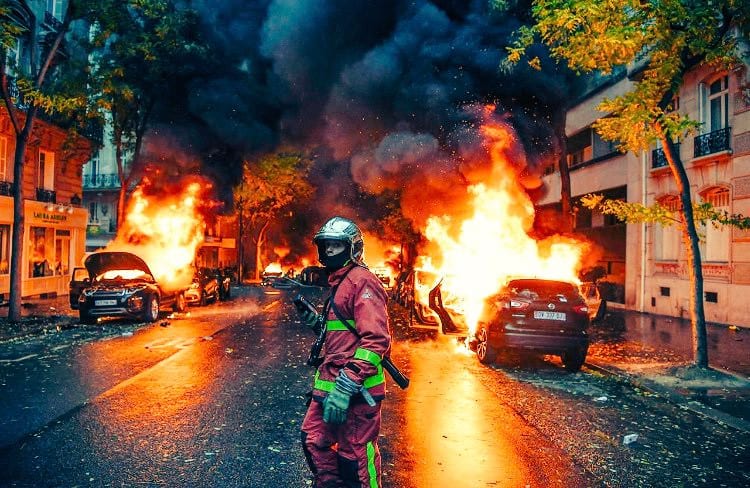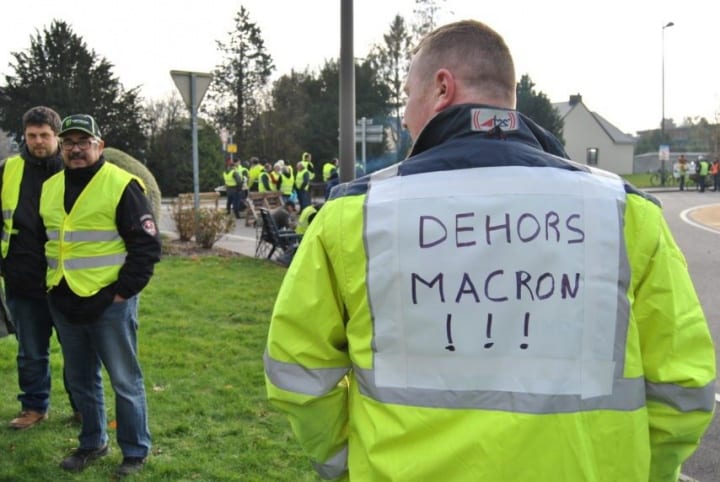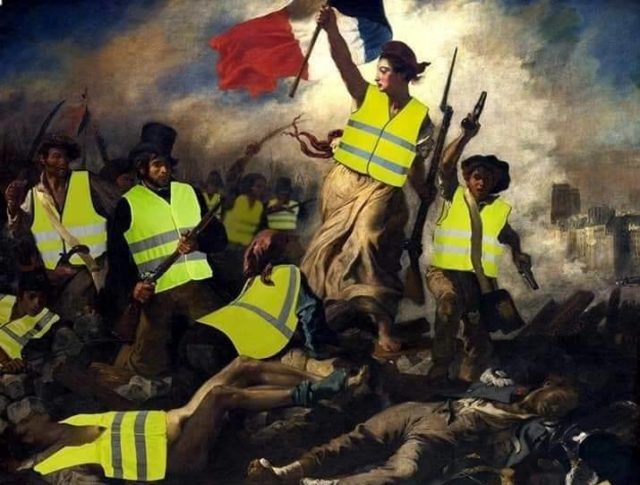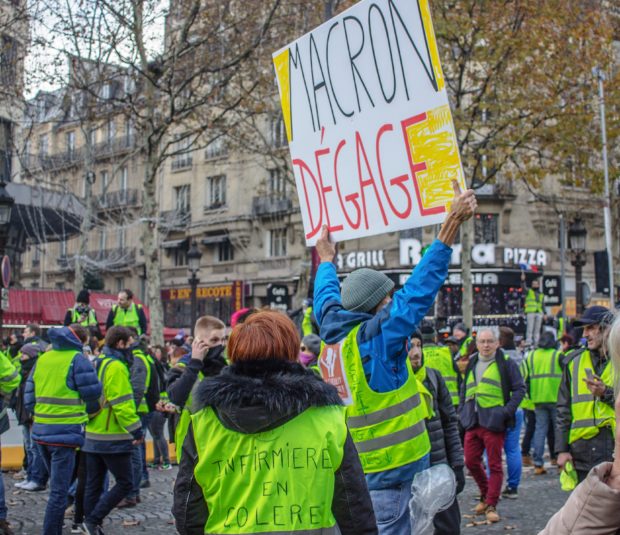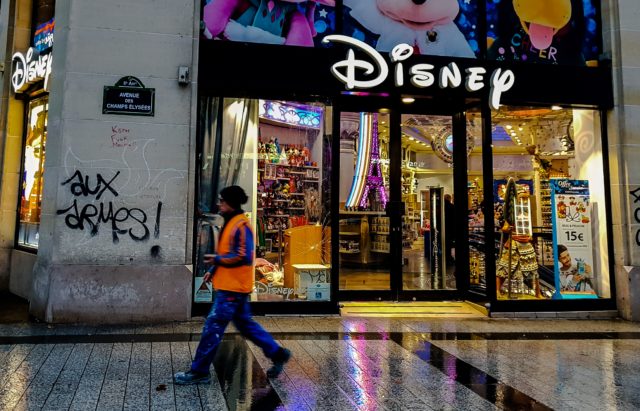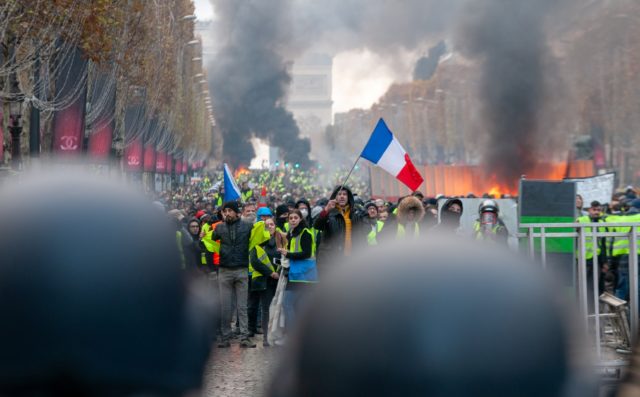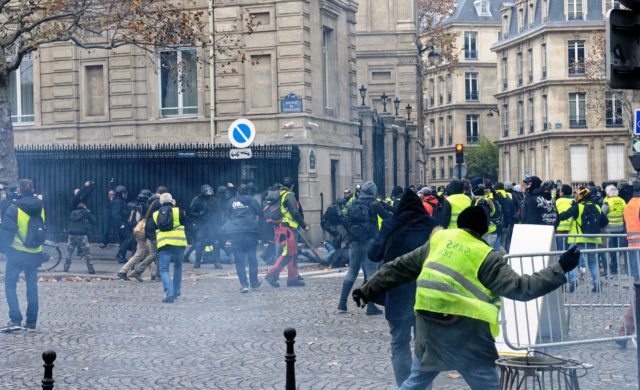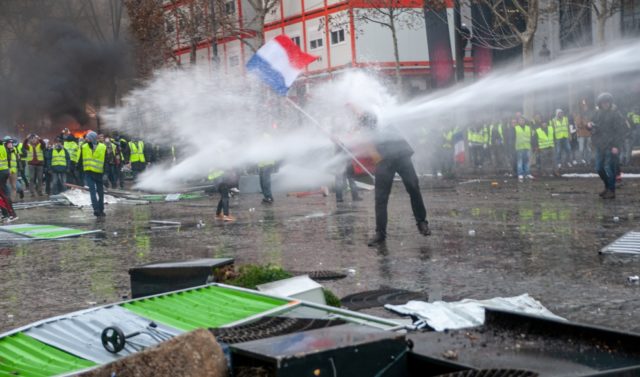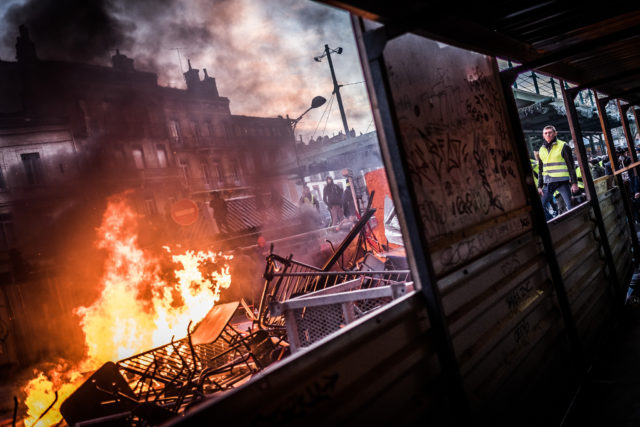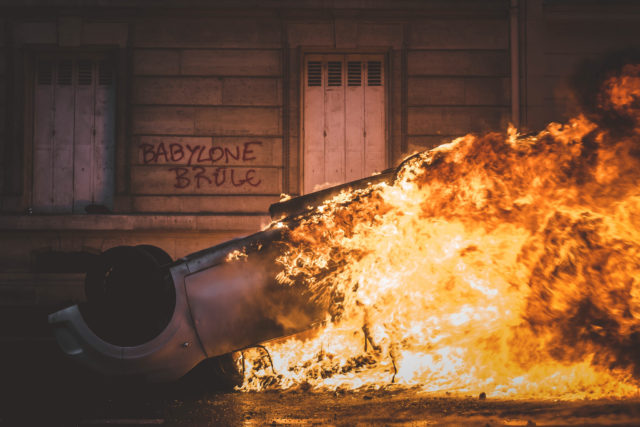Which way forward for France’s “yellow vest” protests?
By Alex Lantier, wsws.org
(EXCERPTED)

Yellow Vests hung outside apartment building, in sign of support. Many continue to approve of the Gilets Jaunes activities, even when the media describes them as violent or wantonly disruptive.
[dropcap]W[/dropcap]ith the fourth Saturday of “yellow vest” protests against President Emmanuel Macron, a mass movement is clearly emerging among workers against the capitalist system. Macron’s withdrawal of the regressive fuel tax hike that initially triggered the protest resolved nothing. Among the “yellow vests,” demands for social equality, large wage increases, Macron’s ouster, eliminating the privileges of the super rich, an end to militarism, and for general strikes and a revolution are coming to the fore.
Claims that the [soviet] bureaucracy’s dissolution of the Soviet Union in 1991 marked the end of the class struggle, the final triumph of capitalist democracy, or the End of History have been blown to pieces. As “yellow vest” protests spread from France to Belgium and the Netherlands, Bulgaria, and as far as Iraq—where workers in Basra donned yellow vests to protest NATO’s neocolonial regime—the international working class is emerging in struggle against the diktat of the banks.
Saturday’s massive crackdown was a searing lesson in the character of bourgeois democracy: as soon as there is any expression of genuine popular opposition, the guns come out. After riot police backed with military armored vehicles and water cannon kettled and assaulted peaceful protesters starting early in the day, violent clashes erupted in all France’s largest cities. A record 1,385 people were arrested.
The “yellow vest” protests are now at a critical stage. The movement has provoked a confrontation not just with the president of the rich, but the entire regime of the rich. Most leading figures in the “yellow vest” movement continue to turn down offers of talks from the political establishment: Macron’s token concessions, binding arbitration by the union bureaucracies, or proposals of an alliance from Jean-Luc Mélenchon’s Unsubmissive France party. The demonstrators also remain overwhelmingly popular.
 The danger, however, is that without a clear political perspective and orientation for a broader struggle against Macron, the movement can be frittered away in fruitless protest actions, or subordinated to the maneuvers of the ruling elite.
The danger, however, is that without a clear political perspective and orientation for a broader struggle against Macron, the movement can be frittered away in fruitless protest actions, or subordinated to the maneuvers of the ruling elite.
These events underscore the contemporary significance of Leon Trotsky’s call to form committees of action, just before the 1936 French general strike. Such bodies can unify strike struggles and protests by different sections of workers and youth, keep them from being isolated and sold out by the union bureaucracies, and provide a rallying point for the vast opposition among broader masses of workers. This provides a basis for mobilizing the deep opposition within the working class to the austerity drive by Macron and the European Union.
Trotsky stressed that for workers, such committees were the “only means of breaking the anti-revolutionary opposition of the trade union and party apparatus.” This is critical today, as workers run straight into the vicious hostility of the unions and allied political parties of the affluent middle class. These forces are desperate to preserve their privileges, by blocking an independent struggle of the working class against Macron and his government of the rich.
[dropcap]N[/dropcap]ot a single established political tendency in France has responded to the “yellow vest” movement, which objectively raises the issue of a challenge to the capitalist system, in a progressive manner. Daniel Cohn-Bendit, the middle-class student leader in May 1968, shamelessly slandered it as fascistic, telling Germany’s taz newpaper that “the large majority of the yellow vest movement comes from the National Front, from the reservoir of the extreme right.”
General Confederation of Labor (CGT) union leader Philippe Martinez insinuated the same thing, darkly hinting that the “yellow vests” are “people we can’t be seen with.” Now, after calling off a truckers’ strike, the CGT is calling a symbolic, one-day rail strike on December 14.
The middle-class New Anticapitalist Party (NPA) aims to use this cynical maneuver to drive the “yellow vests” into the grip of the unions. It called on “yellow vests” to ask Martinez to let them join a general strike controlled by the CGT: “Combative unions and yellow vests should ask or even impose this perspective on the national union leaderships, starting with a real general strike call for the ‘yellow vest’ protest on December 14.”
Under cover of such maneuvers, the ruling class hopes to subordinate the protesters to the unions and the state machine. “The entire political system is shaken,” the Journal du dimanche wrote, but Saturday’s police repression “has given the government maneuvering room, a breath of fresh air.” It hailed the fact that Prime Minister Edouard Philippe concluded his brief speech on Saturday night by saying: “And now for dialog!”
The “yellow vest” protesters are fully justified in their mistrust of all those who try to tie them to fruitless, reactionary deals with Macron. There is nothing to negotiate with Macron, the ruthless representative of the banks; begging the capitalist politicians sitting in the National Assembly to serve the people will likewise bring only disappointment.
The critical task is a political struggle against the Macron government and the power of the banks. In this era of globalized capitalism and international finance, trade and supply chains, this signifies an international struggle on the basis of a genuine socialist program: to expropriate the obscene fortunes of the financial aristocracy, and place the resources of world economy under the democratic control of working people.
This program flows from the objective tasks posed by the upsurge of the class struggle: across Europe, the mounting social anger and strike activity in every country tends towards the eruption of a general strike.
The task of organizing a general strike against the European Union, Macron and similar governments across Europe cannot be left to the unions, who are hostile to the movement and will not carry it out. The way forward is the formation of committees of action that can prepare and lay the basis in the working class for a real general strike, in France and across Europe, carried out in opposition to the maneuvers of the unions and the pseudo-left parties.
—Alex Lantier
SELECT COMMENT
Yes ! Our great Alex Lantier teaches us ! leads us ! comités d'action ! committees of action ! -- here in Marseille on Saturday, it was mass, it was wild ! the young 'casseurs', those who break things -- clumsy definition, well they came and tasted blood ! the beast has been fed ! i know some, i talk to some of these young ones burning the trash containers, breaking bank windows, oh they are so young ! this is personal hatred between them and the riot police : perhaps they've been beaten up and humiliated by some gendarme, or the have a brother in 'Baumette' the infamous jail here on planet Mars, as they call Marseille, but their hatred is visceral, cannot be turned away ! and they are so poor ! parts of Marseille are like the South Bronx was in NY -- but the poor Marseillais et Marseillaises still live in the city center, we're all immigrants and hustlers and bandits and workers here ! no, Marseille is a city of workers, proud of the work they do, and they will face Macron and his riot police, the CRS, and workers' blood will wash into the sea here on the Old Port ! but we will still fight as we have always fought ! remember louis capet XIV, Louis XIV, ol' twinkle-toes Sun-King himself, had the guns of the Fort Saint Jean here at the entrance to the port from the Mediterranean sea, he had the cannons pointed towards the city, towards the city ! in his fear of our notorious reputation for revolt and rebellion ! he was more afraid of us then of invaders from the sea ! as then, as now! vive Marseille ! vive les Marseillais !

This work is licensed under a Creative Commons Attribution-NonCommercial 4.0 International License
![]()
[premium_newsticker id=”154171″]
Revolutionary wisdom
Words from an Irish patriot—
|
By Alex Lantier and Kumaran Ira [dropcap]F[/dropcap]or the fourth consecutive Saturday, “yellow vest” (gilet jaunes) protestors demonstrated yesterday across France against the rightwing government of Emmanuel Macron. They did so in defiance of ominous threats of state violence and a massive mobilization of security forces. Clearly, the French President’s attempts to end the protests, first by postponing the gas tax hikes that set the movement into motion and then by canceling them outright, failed. The demands being raised—for social equality and against militarism and dictatorship—show that this is a movement directed towards the defense of workers’ interests, not just in France, but also internationally. Yesterday’s protests paralyzed France and large sections of Belgium. The Minister of the Interior reported that 125,000 “yellow vests” protested in France. In the major cities where demonstrations were organized most shops were closed. On Saturday evening, the Vinci highway network reported “significant disruptions” and slowdowns on over 20 highways, many of them as the result of “yellow vest” protests and barricades. Demonstrations took place in many cities, including Paris, Lyon, Bordeaux, Toulouse, St. Etienne, Perpignan, Marseille, Avignon, Nantes, Brest, Quimper, Lille and Rennes. Some 400 people were arrested in Brussels during a “yellow vests” rally of 1,000 protesters. This is the second “yellow vest” demonstration in the Belgian capital, directed against rising fuel prices and the increased cost of living. The protestors are demanding the resignation of Prime Minister Charles Michel. Unrest has also spread to the Belgian provinces. “We must take from the rich to give to the poor,” a “yellow vest” nurse told the press. The French government hurled hysterical accusations against protesters descending on Paris, accusing them of preparing to “slaughter” (massacre) the “forces of order.” Police viciously attacked and repressed demonstrations in major cities, arresting almost triple the number of protesters as on the previous Saturday, December 1. Throughout the country, police arrested 1,723 people, a level that French Minister of the Interior Christophe Castaner characterized as “exceptional.” Of these, 1,220 were ordered held in custody. Paris police headquarters announced that more than 1,082 people had been arrested, of whom more than 625 are being kept in custody. Clashes and confrontations between protesters and law enforcement broke out in the major French cities, including Paris, Bordeaux, Lyon and Toulouse. The police fired tear gas and flash balls to disperse the protesters, wounding over 100. In Paris and in Marseille’s Old Port, security forces attacked protestors with armored vehicles and water cannons. In Paris, the police proceeded with extraordinary aggressiveness. To disperse the protesters early in the day, police mounted charges against peaceful demonstrators from the outset, before they could group together in a more powerful mass. Police attacked protesters on the Champs-Elysees and elsewhere in the city, surrounding and trapping peaceful protesters, and dispersing them with armored vehicles and mobile gendarmerie, including a mounted horse brigade. WSWS reporters interviewed people in Paris. Sylvie, from the Oise region of northern France, said, “Every time that there has been anger, it’s because people can no longer provide for themselves. There is no right; there is no left. The unions have also taken us for a ride. We represent the people. We have the right to live decently, we have the right to be respected by those who are supposed to represent us.” She added, “We are also denouncing the 1 percent who take advantage of the 99 percent; we want it to stop. In fact, it is they who tax us, they are the ones who hold the wealth. It’s modern slavery.” Stéphane told us: “Macron very clearly showed where he was going, when he eliminated the tax on the wealthy and reduced my Housing Aid by €5. Is this democracy? No, we are now in a financial dictatorship. And I hope it will not become a military dictatorship. “ Shortly after being teargassed, the wife of a railway worker told the WSWS: “Mr. Macron treats us with contempt. They surround us, they send us to the right, then to the left, and they gas us.” She stressed that Macron no longer has any political legitimacy. “We cannot even demonstrate peacefully anymore; the police force charges us and fires tear gas at us. I hope the people will rise up. Excuse me, but is this a way to treat people, with tear gas?” Once again, the government has indicated that it intends to trample on the demands of the “yellow vests” and continue the austerity policy that has been rejected by the vast majority of the French people. [dropcap]D[/dropcap]uring a very short press conference on Saturday evening, Prime Minister Edouard Philippe stressed that there would be no change in government policy: “Vigilance and mobilization remain in place, because thugs are still at work in Paris and in some provincial towns (...) In order to confront this day, we had to conceive an exceptional plan, with the extensive mobilization of the forces of the law and means to ensure their continuous mobility.” “It is necessary to reestablish our national unity, through dialogue, through work, through regroupment. The President of the Republic [Macron] will speak and propose (...) measures that will allow the French nation to find itself,” he added. Rising anger among workers and young people in the face of official intransigence is developing into an open confrontation between the working class and the government, and towards a general strike. The main advantage the government enjoys at present is that, in this explosive situation, large masses of workers do not clearly see a revolutionary perspective. As they seek to fight against the government, they are confronted with Macron’s support from the petty-bourgeois parties that for decades have posed as the “left.” Jean-Luc Mélenchon is calling for respect for the police. “Never deceive yourself as to your opponent. The handling of police forces is not the job of the police. It is the business of the politicians who give the orders. The duty of the police is to serve and obey. And the orders are political,” tweeted the leader of La France Insoumise (LFI). This defence of the security forces and French state is provoking ever greater mistrust of, and hostility toward, the LFI among the “yellow vests.” On Saturday “yellow vests” in Flixecourt in the northeast announced that, in the name of “political independence,” they would distance themselves from LFI MP Francois Ruffin, who had declared himself to be on their side. Ruffin had said he wanted to serve as a “bridge” between the movement and the government. But this proposal stumbled on the hostility of the “yellow vests” to the union apparatus and their political allies such as the LFI. François Ruffin “gave us very honest support, but we do not want to be taken over by the media or politicians. We are fighting for full political independence, even though, of course, we all have a political color,” said Christophe Ledoux, one of the leaders of the movement in Flixecourt. This development underscores the need to build action committees, independent of the trade union apparatuses, to enable workers in struggle to coordinate their actions, and a Marxist vanguard that will enable workers to identify and thwart attempts by official circles to smother and strangle their struggles. Revolutionary wisdom
Dateline: 8 December 2018 [dropcap]T[/dropcap]oday we will again (read the comments) see large, and mostly peaceful gilets jaunes gatherings all over France to protest the neo-liberal policies of the Macron regime. The biggest ones will naturally occur in the capital Paris. They are likely to later develop into riots. The regime ordered 89,000 policemen onto the streets to counter any potential violence. 8,000 of them will be in Paris alone. A problem is that police are often the cause of riots. Dressed like storm troopers and angry after way too many hours on the street they tend to attack with much brutality even when calm defense would be more appropriate. After last week's protest the Macron regime first delayed and then abolished the planned fuel tax hike that was the immediate cause of the yellow vest protests. That was too little too late and made his regime look weak. The people are now demanding more measures like a reintroduction of the wealth tax which Macron had abolished in one of his first acts in power. Over the last week firemen, ambulance drivers, students and the administrative police union have joined the protests. Luxury shops have been boarded up, museums and landmarks were closed. (An English language livestream can be watched here. Please point to others in the comments.) The police are running an early interdiction tactic, closing off roads and applying tear gas to kettle the people and to prevent larger gatherings at the Champs-Élysées. Hundreds have already been arrested. Meanwhile the protesters sing la Marseillaise. It is way too early for the police to use such force and it is not going to work. This only increases the anger of the protestors and will cause more conflagrations. If the protestors today try to storm the Bastille, the Elyssée palace or whatever, if there are more casualties, more people will join protests and strikes during the next week. Macron will come under even more pressure. He will have to dismiss his prime minister and government. More pressure and he will have to dissolve the parliament and call for new elections. That would likely mean the end of his policies of further enriching the very rich while impoverishing the lower middle class and the poor. Posted by b on December 8, 2018 at 06:26 AM | Permalink Prior dispatches Dateline: 3 December 2018 The current wave of protests in France, which started two weeks ago, is growing in impact and applied violence. On Saturday some 120,000 people took part in demonstrations around the country. The movement was initiated from the political right but many other parties also support it. Most of the participants seem to take part spontaneously. The movement is supposedly leaderless. But it is too early to exclude that there is some larger organizing power behind it. In short: The Arab spring arrived in Europe. Like the 1968 May protests that started in Paris this new movement will have echoes in other countries. While mostly peaceful protest were held in all parts of France the situation in Paris caught the most attention. On Saturday the protesters stormed the Arc de Triomphe. They rearranged the interior, damaged a statue of Marianne, and redecorated the outside. The immediate reason for the protests are an increase of the fuel tax that President Marcron defends as a step to fight climate change. But the fuel tax is only the last drop of a steady stream of price increases for the poor and middle class while their income stagnates. Meanwhile the rich are receiving one tax cut after the other. The fuel price is important for anyone who needs to drive to work. Public transport may work well within the Paris ring-road but most people live beyond the view of the Elysées and do need a car. On Saturday the peaceful protesters in Paris were accompanied by 'moderate rebels'. They left behind the usual trail but are still waiting for foreign powers to arm them. Trump does not get along with Macron. How long will it take for him to suggests a no-fly zone? The use of yellow warning vests, gilets jaunes in french, give the protester a smell of an arranged 'color revolution'. Then again - it is always helpful in demonstrations to distinguish one's side. These warning vests are mandatory emergency equipment in each car, they are readily available and sell for as little as €0.65. After seeing the same neoliberal policies executed under the presidencies of Sarkozy and Hollande, the French people despised both the conservative party as well as the 'socialists'. But they well still not ready to move to a more radical parties on the right or left side. The powers that be put up a former Rothschild banker as an alternative to the established parties and the media pushed him over the finish line. But Macron is even more neoliberal that Sarkozy or Hollande ever were and he is way more aloof and arrogant than both of them. He resembles a modern Marie Antoinette: 'If they don't like my fuel taxes let them buy electric cars.' Macron's next projects are a pension reform and changes in the unemployment insurance. Both will cause more protests. Polls show that the French public overwhelmingly supports the yellow vests protests and their demands while Macron's popularity has fallen from 55% in May 2017 to some 27% now. Some commentators blame the EU for Macron's policies. But that excuse is false. The EU did not demand the elimination of the wealth tax in France. Moreover - the EU implements the policy guidelines the large EU countries set out. Macron could surely change those if he wanted to. On Saturday both sides were violent. But Macron and his police are far from innocent in the escalation. On May 1 Macron's top security aide Alexandre Benalla was filmed beating up protesters. In July a scandal ensued when Macron attempted to cover up the case. He sees violence as an appropriate way to handle resistance against his polices. On Saturday the police even deployed sniper teams on roofs. Today an 80 year old lady in Marseille got killed when a police tear gas canister hit her face. Anthropologist and demographer Emmanuel Todd commentated (vid, french) on the riots on a French TV show. Sophia translated his main points: "The violence comes from Macron. He seems to take pleasure in humiliating ordinary people. With with the Benalla affair, we saw the violence coming out directly, not only from the Elysées, but from the mind of the president. By refusing to enact a moratorium on the taxes that provoked the protests, the govt is enacting the strategy of chaos whereby if these protests, which are popular now, continue, a layer of the population will rise against them." Macron might enact a state of emergency but that would only fuel the protests. It is doubtful that Macron's plan of a 'strategy of chaos' will work. The French president gets elected for 5 years. Only 18 monthS in Macron managed to move a large majority against him. It is unlikely that he will serve out his full term. By Diana Johnstone / Consortium News So the idea of wearing your yellow vest to demonstrate against unpopular government measures caught on quickly. The costume was at hand and didn’t have to be provided by Soros for some more or less manufactured “color revolution”. The symbolism was fitting: in case of socio-economic emergency, show that you don’t want to be run over. As everybody knows, what set off the protest movement was yet another rise in gasoline taxes. But it was immediately clear that much more was involved. The gasoline tax was the last straw in a long series of measures favoring the rich at the expense of the majority of the population. That is why the movement achieved almost instant popularity and support. The Voices of the People
[dropcap]T[/dropcap]he Yellow Vests held their first demonstrations on Saturday, November 17, on the Champs-Elysées in Paris. It was totally unlike the usual trade union demonstrations, well organized to march down the boulevard between the Place de la République and the Place de la Bastille, or the other way around, carrying banners and listening to speeches from leaders at the end. The Gilets Jaunes just came, with no organization, no leaders to tell them where to go or to harangue the crowd. They were just there, in the yellow vests, angry and ready to explain their anger to any sympathetic listener. Briefly, the message was this: we can’t make ends meet. The cost of living keeps going up, and our incomes keep going down. We just can’t take it any more. The government must stop, think and change course. But so far, the reaction of the government was to send police to spray torrents of tear gas on the crowd, apparently to keep the people at a distance from the nearby Presidential residence, the Elysee Palace. President Macron was somewhere else, apparently considering himself above and beyond it all. But those who were listening could learn a lot about the state of France today. Especially in the small towns and rural areas, where many protesters came from. Things are much worse than officials and media in Paris have let on. There were young women who were working seven days a week and despaired of having enough money to feed and clothe their children. People were angry but ready to explain very clearly the economic issues. Colette, age 83, doesn’t own a car, but explained to whoever would listen that the steep raise of gasoline prices would also hurt people who don’t drive, by affecting prices of food and other necessities. She had done the calculations and figured it would cost a retired person 80 euros per month. “Macron didn’t run on the promise to freeze pensions”, recalled a Yellow Vest, but that is what he has done, along with increasing solidarity taxes on pensioners. [dropcap]A[/dropcap] significant and recurring complaint concerned the matter of health care. France has long had the best public health program in the world, but this is being steadily undermined to meet the primary need of capital: profit. In the past few years, there has been a growing government campaign to encourage, and finally to oblige people to subscribe to a “mutuelle”, that is, a private health insurance, ostensibly to fill “the gaps” not covered by France’s universal health coverage. The “gaps” can be the 15% that is not covered for ordinary illnesses (grave illnesses are covered 100%), or for medicines taken off the “covered” list, or for dental work, among other things. The “gaps” to fill keep expanding, along with the cost of subscribing to the mutuelle. [Americans are quite familiar with the arbitrarily legislated cap on Medicare at about 80%, forcing many to buy "supplemental" insurance from private providers like United Healthcare, Humana, etc.—Eds). In reality, this program, sold to the public as modernizing improvement, is a gradual move toward privatization of health care. It is a sneaky method of opening the whole field of public health to international financial capital investment. This gambit has not fooled ordinary people and is high on the list of complaints by the Gilets Jaunes. The Yellow Vests are basicaly your average"citoyen"—the working people of France—men, women, the young and even the old. Hardly terrorists, just folks who have had enough of neoliberalism's insatiable rapacity. The degradation of care in the public hospitals is another complaint. There are fewer and fewer hospitals in rural areas, and one must “wait long enough to die” emergency rooms. Those who can afford it are turning to private hospitals. But most can’t. Nurses are overworked and underpaid. When one hears what nurses have to endure, one is reminded that this is indeed a noble profession. In all this I was reminded of a young woman we met at a public picnic in southwestern France last summer. She cares for elderly people who live at home alone in rural areas, driving from one to another, to feed them, bathe them, offer a moment of cheerful company and understanding. She loves her vocation, loves helping old people, although it barely allows her to make a living. She will be among those who will have to pay more to get from one patient to the next. People pay taxes willingly when they are getting something for it. But not when the things they are used to are being taken away. The tax evaders are the super-rich and the big corporations with their batteries of lawyers and safe havens, or intruders like Amazon and Google, but ordinary French people have been relatively disciplined in paying taxes in return for excellent public services: optimum health care, first class public transport, rapid and efficient postal service, free university education. But all that is under assault from the reign of financial capital called “neo-liberalism” here. In rural areas, more and more post offices, schools and hospitals are shut down, unprofitable train service is discontinued as “free competition” is introduced following European Union directives – measures which oblige people to drive their cars more than ever. Especially when huge shopping centers drain small towns of their traditional shops. Incoherent Energy Policies [dropcap]A[/dropcap]nd the tax announced by the government – an additional 6.6 cents per liter for diesel and an additional 2.9 centers per liter of gasoline – are only the first steps in a series of planned increases over the next years. The measures are supposed to incite people to drive less or even better, to scrap their old vehicles and buy nice new electric cars.
More and more “governance” is an exercise in social engineering by technocrats who know what is best. This particular exercise goes directly opposite to an earlier government measure of social engineering which used economic incitements to get people to buy cars running on diesel. Now the government has changed its mind. Over half of personal vehicles still run on diesel, although the percentage has been dropping. Now their owners are told to go buy an electric car instead. But people living on the edge simply can’t afford the switch. Besides, the energy policy is incoherent. In theory, the “green” economy includes shutting down France’s many nuclear power plants. Without them, where would the electricity come from to run the electric cars? And nuclear power is “clean”, no CO2. So what is going on? People wonder. [The curse of capitalist short-term planning] Indeed, it is perfectly hypocritical to call the French gas tax an “ecotax” since the returns from a genuine ecotax would be invested to develop clean energies – such as tidal power plants. Rather, the benefits are earmarked to balance the budget, that is, to serve the government debt. The Macronian gas tax is just another austerity measure – along with cutting back public services and “selling the family jewels”, that is, selling potential money-makers like Alstom, port facilities and the Paris airports. The Government Misses the Point [dropcap]I[/dropcap]nitial government responses showed that they weren’t listening. They dipped into their pool of clichés to denigrate something they didn’t want to bother to understand. President Macron’s first reaction was to guilt-trip the protesters by invoking the globalists’ most powerful argument for imposing unpopular measures: global warming. Whatever small complaints people may have, he indicated, that is nothing compared to the future of the planet. This did not impress people who, yes, have heard all about climate change and care as much as anyone for the environment, but who are obliged to retort: “I’m more worried about the end of the month than about the end of the world.” After the second Yellow Vest Saturday, November 25, which saw more demonstrators and more tear gas, the Minister in charge of the budget, Gérard Darmanin, declared that what had demonstrated on the Champs-Elysée was “la peste brune”, the brown plague, meaning fascists. (For those who enjoy excoriating the French as racist, it should be noted that Darmanin is of Algerian working class origins). This remark caused an uproar of indignation that revealed just how great is public sympathy for the movement – over 70% approval by latest polls, even after uncontrolled vandalism. Macron’s Minister of the Interior, Christophe Castaner, was obliged to declare that government communication had been badly managed. Of course, that is the familiar technocratic excuse: we are always right, but it is all a matter of our “communication”, not of the facts on the ground. Maybe I have missed something, but of the many interviews I have listened to, I have not heard one word that would fall into the categories of “far right”, much less “fascism” – or even that indicated any particular preference in regard to political parties. These people are wholly concerned with concrete practical issues. Not a whiff of ideology – remarkable in Paris! Some people ignorant of French history and eager to exhibit their leftist purism have suggested that the Yellow Vests are dangerously nationalistic because they occasionally wave French flags and sing La Marseillaise. That simply means that they are French. Historically, the French left is patriotic, especially when it is revolting against the aristocrats and the rich or during the Nazi Occupation. ( The exception was the student uprising of May 1968, which was not a revolt of the poor but a revolt in a time of prosperity in favor of greater personal freedom: “it is forbidden to forbid”. The May ’68 generation has turned out to be the most anti-French generation in history, for reasons that can’t be dealt with here. To some extent, the Yellow Vests mark a return of the people after half a century of scorn from the liberal intelligentsia.) It is just a way of saying, We are the people, we do the work, and you must listen to our grievances. To be bad, “nationalism” must be aggressive toward other nations. This movement is not attacking anybody, it is strictly staying home. The Weakness of Macron [dropcap]T[/dropcap]he Yellow Vests have made clear to the whole world that Emmanuel Macron was an artificial product sold to the electorate by an extraordinary media campaign. Macron was the rabbit magically pulled out of a top hat, sponsored by what must be called the French oligarchy. After catching the eye of established king-maker Jacques Attali, the young Macron was given a stint at the Rothschild bank where he could quickly gain a small fortune, ensuring his class loyalty to his sponsors. Media saturation and the scare campaign against “fascist” Marine LePen (who moreover flubbed her major debate) put Macron in office. He had met his wife when she was teaching his theater class, and now he gets to play President. The mission assigned to him by his sponsors was clear. He must carry through more vigorously the “reforms” (austerity measures) already undertaken by previous governments, which had often dawdled at hastening the decline of the social State. And beyond that, Macron was supposed to “save Europe”. Saving Europe means saving the European Union from the quagmire in which it finds itself. This is why cutting expenses and balancing the budget is his obsession. Because that’s what he was chosen to do by the oligarchy that sponsored his candidacy. He was chosen by the financial oligarchy above all to save the European Union from threatening disintegration caused by the euro. The treaties establishing the EU and above all the common currency, the euro, have created an imbalance between member states that is unsustainable. The irony is that previous French governments, starting with Mitterrand, are largely responsible for this state of affairs. In a desperate and technically ill-examined effort to keep newly unified Germany from becoming the dominant power in Europe, the French insisted on binding Germany to France by a common currency. Reluctantly, the Germans agreed to the euro – but only on German terms. The result is that Germany has become the unwilling creditor of equally unwilling EU member states, Italy, Spain, Portugal and of course, ruined Greece. The financial gap between Germany and its southern neighbors keeps expanding, which causes ill will on all sides. Germany doesn’t want to share economic power with states it considers irresponsible spendthrifts. So Macron’s mission is to show Germany that France, despite its flagging economy, is “responsible”, by squeezing the population in order to pay interest on the debt. Macron’s idea is that the politicians in Berlin and the bankers in Frankfurt will be so impressed that they will turn around and say, well done Emmanuel, we are ready to throw our wealth into a common pot for the benefit of all 27 Member States. And that is why Macron will stop at nothing to balance the budget, to make the Germans love him. So far, the Macron magic is not working on the Germans, and it’s driving his own people into the streets. Or are they his own people? Does Macron really care about his run of the mill compatriots who just work for a living? The consensus is that he does not. Macron is losing the support both of the people in the streets and the oligarchs who sponsored him. He is not getting the job done. Macron’s rabbit-out-of-the hat political ascension leaves him with little legitimacy, once the glow of glossy magazine covers wears off. With help from his friends, Macron invented his own party, La République en Marche, which doesn’t mean much of anything but suggested action. He peopled his party with individuals from “civil society”, often medium entrepreneurs with no political experience, plus a few defectors from either the Socialist or the Republican Parties, to occupy the most important government posts. The only well-known recruit from “civil society” was the popular environmental activist, Nicolas Hulot, who was given the post of Minister of Environment, but who abruptly resigned in a radio announcement last August, citing frustration. Macron’s strongest supporter from the political class was Gérard Collomb, Socialist Mayor of Lyons, who was given the top cabinet post of Minister of Interior, in charge of national police. But shortly after Hulot left, Collomb said he was leaving too, to go back to Lyons. Macron entreated him to stay on, but on October 3, Collomb went ahead and resigned, with a stunning statement referring to “immense problems” facing his successor. In the “difficult neighborhoods” in the suburbs of major cities, he said, the situation is “very much degraded : it’s the law of the jungle that rules, drug dealers and radical Islamists have taken the place of the Republic.” Such suburbs need to be “reconquered”. After such a job description, Macron was at a loss to recruit a new Interior Minister. He groped around and came up with a crony he had chosen to head his party, ex-Socialist Christophe Castaner. With a degree in criminology, Castaner’s main experience qualifying him to head the national police is his close connection, back in his youth in the 1970s, with a Marseilles Mafioso, apparently due to his penchant for playing poker and drinking whiskey in illegal dens. Saturday, November 17, demonstrators were peaceful, but resented the heavy teargas attacks. Saturday November 25, things got a big rougher, and on Saturday December 1st, all hell broke loose. With no leaders and no service d’ordre (militants assigned to protect the demonstrators from attacks, provocations and infiltration), it was inevitable that casseurs (smashers) got into the act and started smashing things, looting shops and setting fires to trash cans, cars and even buildings. Not only in Paris, but all over France: from Marseilles to Brest, from Toulouse to Strasbourg. In the remote town of Puy en Velay, known for its chapel perched on a rock and its traditional lace-making, the Prefecture (national government authority) was set on fire. Tourist arrivals are cancelled and fancy restaurants are empty and department stores fear for their Christmas windows. The economic damages are enormous. And yet, support for the Yellow Vests remains high, probably because people are able to distinguish between those grieved citizens and the vandals who love to wreak destruction for its own sake. On Monday, there were suddenly fresh riots in the troubled suburbs that Collomb warned about as he retreated to Lyons. This was a new front for the national police, whose representatives let it be known that all this was getting to be much too much for them to cope with. Announcing a state of emergency is not likely to solve anything. Macron is a bubble that has burst. The legitimacy of his authority is very much in question. Yet he was elected in 2017 for a five year term, and his party holds a large majority in parliament that makes his destitution almost impossible. So what next? Despite having been sidelined by Macron’s electoral victory in 2017, politicians of all hews are trying to recuperate the movement – but discreetly, because the Gilets Jaunes have made clear their distrust of all politicians. This is not a movement that seeks to take power. It simply seeks redress of its grievances. The government should have listened in the first place, accepted discussions and compromise. This gets more difficult as time goes on, but nothing is impossible. For some two or three hundred years, people one could call “left” hoped that popular movements would lead to changes for the better. Today, many leftists seem terrified of popular movements for change, convinced “populism” must lead to “fascism”. This attitude is one of many factors indicating that the changes ahead will not be led by the left as it exists today. Those who fear change will not be there to help make it happen. But change is inevitable and it need not be for the worse. If you enjoyed this original article please consider making a donation to Consortium News so they can bring you more stories like this one. “Pour le peuple, il y a toujours la misère!” Anonymous Gilet Jaune [dropcap]F[/dropcap]rom the Island of La Reunion to the Napoleonic symbol that is the Arc de Triomphe, through big and small towns, as well as the usually bucolic countryside in France, there is something special in the air: the smell of fires on barricades, the smoke of tear gas, the anger built upon decades of inequality, injustice and despair for most. Among the Gilets Jaunes, many understand intuitively that the current democratic process is dead, and therefore the only option is the occupation of streets and roads. History usually moves at a snail’s pace, but sometimes a series of events abruptly push societies to a breakdown, to the fascinating and somewhat beautiful and chaotic quantum leap that is a revolution. Some cultures have it in their collective DNA to embrace, without fear, the chaotic changes of revolutionary turmoil: France is not only one of them, it was arguably the first one when its sans-culottes citizens cut off the head of their absolute monarch Louis XVI. It was unthinkable then; could it happen again? From gas-tax protests to “Macron Démission!” It is still premature to call the Gilets Jaunes movement a revolution, but one can say categorically that this unexpected and spontaneous grassroots movement has put France on track for the preliminary stages of such a dramatic event. While the Gilets Jaunes started as an apolitical protest mainly focused on gas taxes deemed unfair, it has, in a matter of three weeks, morphed into a movement that calls for many structural changes as well as the resignation of France’s President, Emmanuel Macron. The French government is under attack and says that the Republic is in peril from the chaos of the unreasonable extremists within the Gilets Jaunes. What the yellow vests of the Gilets Jaunes symbolizes is blue-collar workers, struggling retirees and students who revolt against the suits of the political class and CEOs. The Gilets Jaunes feel betrayed by the political class and even the Republic, and they view Macron as the president of the rich, acting often like a king and as if he is whispering about his subjects the “let them eat cake” of Marie-Antoinette. It is an anger over social inequality that fuels the Gilets Jaunes. While the integrity of the European Union should be defended for geopolitical reasons — otherwise European nations will lose their voices on the world stage — if the Gilets Jaunes movement spreads, perhaps the EU can fully become a European Union by and for the people, not the current EU of a rarefied ruling class. A popular anti-capitalist revolt not a populist neofascist rise The Gilets Jaunes movement is strictly horizontal, without a hierarchy or recognized leaders. It has, so far, refused to be hijacked by political parties: either the Rassemblement Nationale of Marine Le Pen on the far-Right, or La France Insoumise of Jean-Luc Melenchon on the Left. It has also rejected association with French labor unions. Without spelling it out, the Gilets Jaunes movement is anti-capitalist: a guttural revolt of the have-nots against the elite. It is a popular, not a populist, movement. Europeans and even American populist-nationalists are already distorting the Gilets Jaunes’ significance to serve their political agenda. As opposed to the rise of nationalism-populism elsewhere, such as in Italy, Austria, Hungary, the UK as expressed by BREXIT, the US, and Brazil with the election of Bolsonaro, the Gilets Jaunes do not have an anti-immigration or even an anti-EU agenda that reeks of racism and neofascism. “Les riches parlent de la fin du monde, on a peur des fins de mois” The Gilets Jaunes are in revolt against capitalism or neoliberalism, which is a worldwide system of concentration of wealth and power into a few hands. With our pending ecological collapse and vanishing biodiversity, capitalism has failed and is reaching its end game. Unlike the neofascist science deniers, the Gilets Jaunes perceive climate change as a crisis, but they say that it is hard to focus on a global ecological collapse when you live from paycheck to paycheck. They feel that they deal with the anxiety of putting food on the table at the end of the month while the rich talk about the end of the world. Thinking about humanity’s survival is hard to do on an empty stomach. May 1968 or 1789? Some outside observers, as well as a few Gilets Jaunes have made an analogy between this movement and the events of May 1968 in France, from which the main result was the resignation of General Charles de Gaulle. This is questionable. The 1968 movement was, at its origins, a student movement partially inspired by neo-Marxist ideas. In France, and worldwide, especially in the US, there was the somewhat fuzzy hippy peace-and-love cultural trend dancing to the soundtrack of Woodstock. This was more like a mini cultural revolution: a clash of generations, with the youths revolting against the moral rigidity of their parents. As the ultimate father-figure, General de Gaulle was a prime target. As the baby boomers came of age, the late 1960s everywhere were more about sexual liberation than anything else. In our darker times, when humanity’s extinction has become a legitimate topic of discussion, this hedonist element is entirely gone. The Gilets Jaunes are about bread-and-butter issues, not free love. This is not the Gilets Jaunes reality, as their demographic is, on average, much older. In this regard, the Gilets Jaunes have more in common with the sans-culottes of the 1789 French Revolution than the sons and daughters of the bourgeoisie of 1968. Gilets Jaunes is at its core a blue-collar revolt against unfair taxation and blatant social injustice, a revolt against the dead end that is global capitalism. The “casseurs” are insurgents: repression or compromises? French mainstream media, which are all on the side of the establishment, have portrayed some Gilets Jaunes as “casseurs” responsible for what they describe as urban guerrilla warfare. By doing so, they are attempting to gut the protests of their sociological and political content. Casseurs break things and attack riot police for no reason, whereas the insurgent segment of the Gilets Jaunes target symbols of capitalism, such as luxury stores and banks, and retaliate against the blind violence of the state personified by the CRS riot police. Macron’s compromise to scrap the gas tax hike is viewed as too little too late. Gilets Jaunes demands have grown to include systemic fiscal and social changes, such as: reinstalling the Impot sur la Fortune (ISF) that taxes the rich; and increasing both the minimum wage and minimum retirement income to 1,300 Euros a month. Macron can either compromise on these and other points, get rid of his prime minister, and perhaps dissolve the National Assembly and call for new elections. Or he could harden the police repression by declaring a state of emergency and, even worse, call on the French Army to maintain order as some police officials have suggested, in which case the state of emergency would become a de-facto martial law. Playing hard ball with the Gilets Jaunes could be a fatal mistake for the French government. Back in 1789, King Louis XVI had a chance to abdicate his absolute power and become a constitutional monarch: he refused, and this mistake cost him his head. Revolutions need revolution Revolutions never happen in a sociological and historical vacuum. This being said, the spark that can light up the fuse of such an atypical event is usually unexpected. A population can take only so much inequality, injustice and oppression. Under inhumane and unbearable pressures, societal time bombs do go off. Revolutions, successful or not, express a collective rage against a social order that has failed the vast fraction of a population. It is the fracture when talks and compromise become useless, a break point where violence and destruction appear to be the only options. This critical mass was reached for the brutalized and exploited French sans-culottes in 1789, Haitian slaves in 1791, Russian serfs in 1917, and Chinese workers and farmers in 1949. As an expression of the anger of a population with nothing left to lose, cornered by a delusional ruling class, revolutionary explosions are mighty and often unstoppable. Time will tell if the Gilets Jaunes movement has enough legs and bite to catalyze such an improbable revolutionary event. Special video: Yellow Vests confront police —CRS Editor’s Notes: Gilbert Mercier is the author of The Orwellian Empire. Revolutionary wisdom |


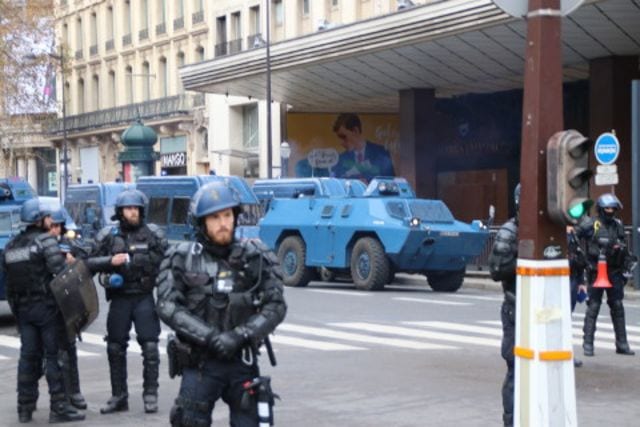








 One woman makes an good point. Yes, the violence as seen in Paris last weekend was not nice. But only after last week's protest went violent were the yellow vests really noted by the media and by the otherwise tone deaf politicians.
One woman makes an good point. Yes, the violence as seen in Paris last weekend was not nice. But only after last week's protest went violent were the yellow vests really noted by the media and by the otherwise tone deaf politicians.
